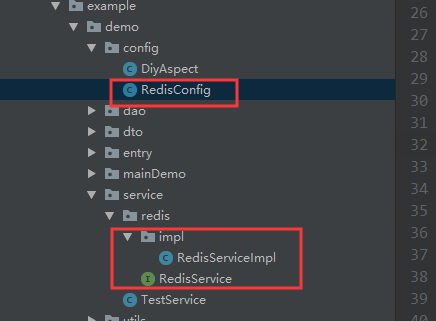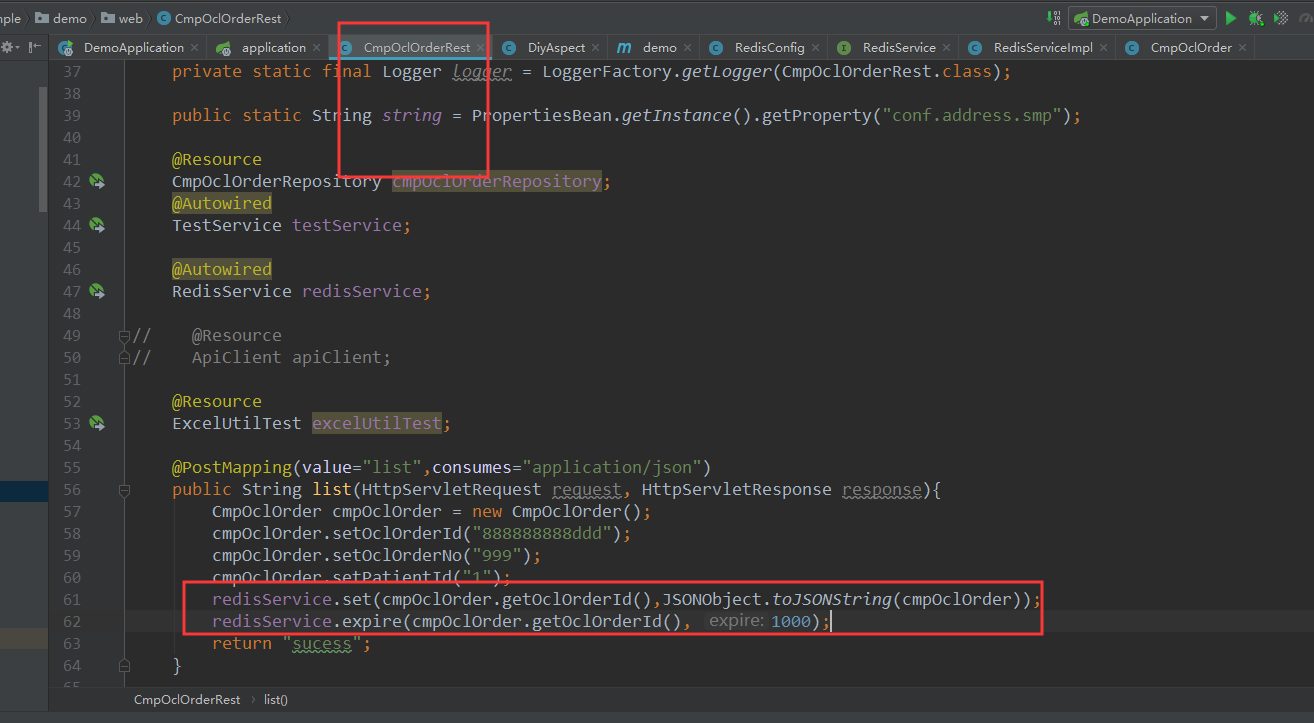三步上篮
1、导入redis依赖
<dependency>
<groupId>org.springframework.boot</groupId>
<artifactId>spring-boot-starter-data-redis</artifactId>
</dependency>
2.编写config
package com.example.demo.config; import com.alibaba.fastjson.support.spring.FastJsonRedisSerializer; import org.springframework.beans.factory.annotation.Autowired; import org.springframework.cache.CacheManager; import org.springframework.cache.annotation.CachingConfigurerSupport; import org.springframework.cache.annotation.EnableCaching; import org.springframework.context.annotation.Bean; import org.springframework.context.annotation.Configuration; import org.springframework.context.annotation.Primary; import org.springframework.data.redis.cache.RedisCacheConfiguration; import org.springframework.data.redis.cache.RedisCacheManager; import org.springframework.data.redis.cache.RedisCacheWriter; import org.springframework.data.redis.connection.RedisConnectionFactory; import org.springframework.data.redis.core.*; import org.springframework.data.redis.serializer.RedisSerializationContext; import org.springframework.data.redis.serializer.StringRedisSerializer; import java.time.Duration; /** * Redis配置 * * @author chenshun * @email [email protected] * @date 2017-07-70 19:22 */ @Configuration @EnableCaching public class RedisConfig extends CachingConfigurerSupport { @Autowired private RedisConnectionFactory factory; // RedisTemplate<String, Object> redisTemplate = new RedisTemplate<>(); // //定义value的序列化方式 // Jackson2JsonRedisSerializer jackson2JsonRedisSerializer = new Jackson2JsonRedisSerializer(Object.class); // ObjectMapper om = new ObjectMapper(); // om.setVisibility(PropertyAccessor.ALL, JsonAutoDetect.Visibility.ANY); // om.enableDefaultTyping(ObjectMapper.DefaultTyping.NON_FINAL); // jackson2JsonRedisSerializer.setObjectMapper(om); // // redisTemplate.setKeySerializer(new StringRedisSerializer()); // redisTemplate.setHashKeySerializer(new StringRedisSerializer()); // redisTemplate.setValueSerializer(jackson2JsonRedisSerializer); // redisTemplate.setHashValueSerializer(jackson2JsonRedisSerializer); // redisTemplate.setConnectionFactory(factory); @Bean @SuppressWarnings("rawtypes") public RedisTemplate<String, Object> redisTemplate() { RedisTemplate<String, Object> redisTemplate = new RedisTemplate<>(); redisTemplate.setKeySerializer(new StringRedisSerializer()); redisTemplate.setHashKeySerializer(new StringRedisSerializer()); redisTemplate.setHashValueSerializer(new FastJsonRedisSerializer(Object.class)); redisTemplate.setValueSerializer(new FastJsonRedisSerializer(Object.class)); redisTemplate.setConnectionFactory(factory); return redisTemplate; } @Bean public HashOperations<String, String, Object> hashOperations(RedisTemplate<String, Object> redisTemplate) { return redisTemplate.opsForHash(); } @Bean public ValueOperations<String, String> valueOperations(RedisTemplate<String, String> redisTemplate) { return redisTemplate.opsForValue(); } @Bean public ListOperations<String, Object> listOperations(RedisTemplate<String, Object> redisTemplate) { return redisTemplate.opsForList(); } @Bean public SetOperations<String, Object> setOperations(RedisTemplate<String, Object> redisTemplate) { return redisTemplate.opsForSet(); } @Bean public ZSetOperations<String, Object> zSetOperations(RedisTemplate<String, Object> redisTemplate) { return redisTemplate.opsForZSet(); } /**缓存管理器*/ @Primary @Bean @SuppressWarnings({ "unchecked", "rawtypes" }) public CacheManager cacheManager(RedisTemplate redisTemplate) { //初始化一个RedisCacheWriter RedisCacheWriter redisCacheWriter = RedisCacheWriter.nonLockingRedisCacheWriter(redisTemplate.getConnectionFactory()); //设置CacheManager的值序列化方式为json序列化 RedisSerializationContext.SerializationPair<Object> pair = RedisSerializationContext.SerializationPair.fromSerializer(new FastJsonRedisSerializer(Object.class)); RedisCacheConfiguration defaultCacheConfig = RedisCacheConfiguration.defaultCacheConfig().serializeValuesWith(pair); //设置默认超过时期是1天 defaultCacheConfig.entryTtl(Duration.ofDays(1)); //初始化RedisCacheManager return new RedisCacheManager(redisCacheWriter, defaultCacheConfig); } }
3.实现redis服务(redis存取调用service)

package com.example.demo.service.redis; import java.util.Map; import java.util.concurrent.TimeUnit; /** * redis操作Service, * 对象和数组都以json形式进行存储 * Created by macro on 2018/8/7. */ public interface RedisService { /** * 存储数据 */ void set(String key, String value); void setStringExpire(String key, String value, long expire, TimeUnit timeUnit); /** * 存储数据 */ void setExpire(String key, Object value, long expire); /** * 获取数据 */ String get(String key); /** * 设置超期时间 */ boolean expire(String key, long expire); /** * 删除数据 */ void remove(String key); /** * 自增操作 * * @param delta 自增步长 */ Long increment(String key, long delta); <T> T getMapField(String key, String field, Class<T> clazz); void delMapField(String key, String... field); <T> void addMap(String key, String field, T obj); void setMap(String key, Map<Object, Object> value); Map<Object, Object> getMap(String key); }
package com.example.demo.service.redis.impl; import com.example.demo.service.redis.RedisService; import org.springframework.beans.factory.annotation.Autowired; import org.springframework.data.redis.core.BoundHashOperations; import org.springframework.data.redis.core.RedisTemplate; import org.springframework.data.redis.core.StringRedisTemplate; import org.springframework.stereotype.Service; import java.util.Map; import java.util.concurrent.TimeUnit; /** * redis操作Service的实现类 * Created by macro on 2018/8/7. */ @Service public class RedisServiceImpl implements RedisService { @Autowired private StringRedisTemplate stringRedisTemplate; @Autowired private RedisTemplate<String, Object> redisTemplate; @Override public void set(String key, String value) { stringRedisTemplate.opsForValue().set(key, value); } @Override public void setStringExpire(String key, String value, long expire,TimeUnit timeUnit) { stringRedisTemplate.opsForValue().set(key, value); stringRedisTemplate.expire(key,expire,timeUnit); } @Override public void setExpire(String key, Object value, long expire) { redisTemplate.opsForValue().set(key, value); redisTemplate.expire(key, expire, TimeUnit.SECONDS); } @Override public String get(String key) { return stringRedisTemplate.opsForValue().get(key); } @Override public boolean expire(String key, long expire) { return redisTemplate.expire(key, expire, TimeUnit.SECONDS); } @Override public void remove(String key) { stringRedisTemplate.delete(key); } @Override public Long increment(String key, long delta) { return stringRedisTemplate.opsForValue().increment(key, delta); } @Override public <T> T getMapField(String key, String field, Class<T> clazz) { return (T) redisTemplate.boundHashOps(key).get(field); } @Override public void delMapField(String key, String... field) { BoundHashOperations<String, String, ?> boundHashOperations = redisTemplate.boundHashOps(key); boundHashOperations.delete(field); } @Override public <T> void addMap(String key, String field, T obj) { redisTemplate.opsForHash().put(key, field, obj); } @Override public Map<Object, Object> getMap(String key) { return redisTemplate.opsForHash().entries(key); } @Override public void setMap(String key, Map<Object, Object> value) { redisTemplate.opsForHash().putAll(key, value); } }
最后 调用测试


另外 贴个yml中的redis配置
# DATASOURCE (DataSourceAutoConfiguration & DataSourceProperties) spring: datasource: driver-class-name: com.mysql.jdbc.Driver url: jdbc:mysql://127.0.0.1:3306/ispd25?useUnicode=true&characterEncoding=utf-8&useSSL=false&serverTimezone=UTC&allowPublicKeyRetrieval=true username: root password: 123 # Tomcat datasource specific settings # org.apache.tomcat.jdbc.pool.DataSource org.apache.tomcat.jdbc.pool.PoolProperties #初始化连接: 连接池启动时创建的初始化连接数量 tomcat: initial-size: 5 #最大活动连接: 连接池在同一时间能够分配的最大活动连接的数量,如果设置为非正数则表示不限制 max-active: 60 #最大空闲连接: 连接池中容许保持空闲状态的最大连接数量, 超过的空闲连接将被释放, 如果设置为负数表示不限制 max-idle: 10 #最小空闲连接: 连接池中容许保持空闲状态的最小连接数量, 低于这个数量将创建新的连接, 如果设置为0则不创建.默认与initialSize相同 min-idle: 5 # 最大等待时间: 当没有可用连接时, 连接池等待连接被归还的最大时间( 以毫秒计数), 超过时间则抛出异常, 如果设置为-1 表示无限等待单位毫秒 max-wait: -1 #是否对空闲连接进行校验,如果检测失败, 则连接将被从池中去除.注意: 设置为true 后如果要生效,validationQuery 参数必须设置为非空字符串 test-while-idle: true #SQL 查询, 用来验证从连接池取出的连接 validation-query: SELECT 1 #空闲连接回收器执行间隔,单位毫秒 time-between-eviction-runs-millis: 310000 # Validate the connection before borrowing it from the pool. test-on-borrow: true #校验查询超时时间以秒为单位 validation-query-timeout: 10 #避免过度验证,保证验证不超过这个频率——以毫秒为单位 validation-interval: 30000 #空闲连接能够保持空闲的最小时间,单位毫秒,在这个区间不会被回收器回收 min-evictable-idle-time-millis: 1200000 #空闲连接回收器的执行线程数 num-tests-per-eviction-run: 10 #检查连接是否泄漏(一般是因为没有关闭连接),如果他们超过了removeAbandonedTimout 的限制.如果设置为true, 连接被认为是被泄露并且可以被删除, remove-abandoned: true #连接多久没有释放则认为是泄漏线程 remove-abandoned-timeout: 1800 # JPA (JpaBaseConfiguration, HibernateJpaAutoConfiguration) # Enable JPA repositories. data: jpa: repositories: enabled: true jpa: database: MYSQL # Initialize the schema on startup. generate-ddl: false # DDL mode. This is actually a shortcut for the "hibernate.hbm2ddl.auto" property. Default to "create-drop" when using an embedded database, "none" otherwise. hibernate: ddl-auto: none open-in-view: false # Additional native properties to set on the JPA provider. properties: hibernate: dialect : org.hibernate.dialect.MySQL5Dialect format_sql: true show-sql: true redis: host: 192.168.111.147 port: 6379 database: 3 timeout: 20000ms password: jedis: pool: max-active: 8 min-idle: 0 max-idle: 8 max-wait: -1ms cache: time: 3000 enable: true conf: address: smp: http://192.168.11.130:8026 ftp: host: 192.168.10.25 port: 21 username: uftp password: 1234 ftpPath: /data/ visit: http://192.168.10.25:8050/ imageSize: 10485760